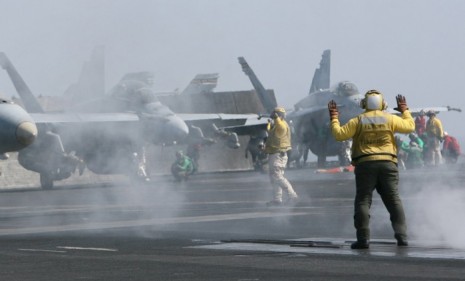Will the Bahrain crisis benefit Iran?
The uprising in Bahrain could force a U.S. Navy fleet out of the Gulf, and ease pressure on Iran's Mahmoud Ahmadinejad

A free daily email with the biggest news stories of the day – and the best features from TheWeek.com
You are now subscribed
Your newsletter sign-up was successful
Of all the Arab nations swept up in the post-Tunisia domino wave of anti-government protests, Bahrain may pose the biggest threat to the U.S. The tiny Persian Gulf island kingdom houses the U.S. Navy's 5th Fleet and an Air Force base, a toehold the U.S. relies on to contain neighboring Iran. The Bahrain base also allows the U.S. to keep tabs on the 40 percent of the world's oil that passes through the Strait of Hormuz. Bahrain's protesters are mostly Shiite Muslims, as in Iran. If they overthrow the Sunni royal family and force the U.S. out, will Iran gain the upper hand in the region? (Watch a Euronews report about Bahrain's protests)
The U.S. should be worried: America's Bahrain bases are crucial to its oil safeguarding, spying, and "power projection" activities in the Gulf, says Peter Goodspeed in National Post. If Bahrain's protesters win, and kick the U.S. out, it will be "difficult to threaten Iran or to enforce international sanctions" against it. Iran "would love to see the U.S. Navy expelled from Bahrain and can be expected to encourage the Shiite opposition."
"Unrest in Bahrain could threaten key U.S. military outpost"
The Week
Escape your echo chamber. Get the facts behind the news, plus analysis from multiple perspectives.

Sign up for The Week's Free Newsletters
From our morning news briefing to a weekly Good News Newsletter, get the best of The Week delivered directly to your inbox.
From our morning news briefing to a weekly Good News Newsletter, get the best of The Week delivered directly to your inbox.
This is about Bahrain, not Iran: The U.S. media is framing this as a Sunni-Shiite battle, and we all know, at least vaguely, by now that "Shiites have something to do with Iran," says Aaron Bady in Zunguzungu. But a closer look suggests this is class warfare — the haves, mostly Sunni, versus the largely Shiite have-nots — not a "sectarian conflict." Besides, these protests have been going on for "quite some time." We're just finally noticing them now.
"Is Bahrain a Shiite uprising?"
Saudi Arabia won't let Bahrain fall: Bahrain's king has "kept a lid on the situation" so far by deftly mixing carrots and sticks, says Stephen J. Smith in Reason. But if that strategy doesn't "hold up to the revolutionary tide sweeping the Middle East," the Saudis will step in. Bahrain may host the U.S. Navy, but it also abuts Saudi Arabia's oil-rich, Shiite-majority Eastern Province. The Sunni House of Saud won't risk any clever "ideas about self-rule" spilling over from a Bahrain revolution.
"Does the unrest in Bahrain threaten the Saudi monarchy?"
A free daily email with the biggest news stories of the day – and the best features from TheWeek.com
-
 Film reviews: ‘Send Help’ and ‘Private Life’
Film reviews: ‘Send Help’ and ‘Private Life’Feature An office doormat is stranded alone with her awful boss and a frazzled therapist turns amateur murder investigator
-
 Movies to watch in February
Movies to watch in Februarythe week recommends Time travelers, multiverse hoppers and an Iraqi parable highlight this month’s offerings during the depths of winter
-
 ICE’s facial scanning is the tip of the surveillance iceberg
ICE’s facial scanning is the tip of the surveillance icebergIN THE SPOTLIGHT Federal troops are increasingly turning to high-tech tracking tools that push the boundaries of personal privacy